Schooldays Over, Come on Then John
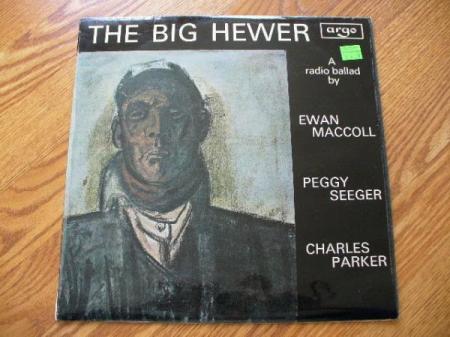
[1960]
Parole di Ewan MacColl
Musica di Ewan MacColl e Peggy Seeger
In "The Big Hewer - A Radio Ballad About Britain's Coal Miners", trasmissione radiofonica in onda nel 1960 sulla BBC Radio, prodotta da Charles Parker (1919-1980), scrittore, cantante ed attore teatrale. Il disco è del 1967, poi riedito nel 1999.
Si tratta della quarta di otto emissioni curate da MacColl e dalla Seeger tra il 1957 ed il 1964.
La coppia si avvalse della collaborazione di artisti prestigiosi, come Dave Swarbrick, A. L. Lloyd, Ian Campbell, Isla Cameron e Louis Killen.
Interpreta da molti, tra cui i Dubliners, i Chieftains, Dick Gaughan, Damien Dempsey, i Clancy Brothers, Dropkick Murphys con Billy Bragg
Pitman e collier sono entrambi sinonimi di miner, tre modi diversi che l'inglese ha per indicare il minatore del carbone...
Parole di Ewan MacColl
Musica di Ewan MacColl e Peggy Seeger
In "The Big Hewer - A Radio Ballad About Britain's Coal Miners", trasmissione radiofonica in onda nel 1960 sulla BBC Radio, prodotta da Charles Parker (1919-1980), scrittore, cantante ed attore teatrale. Il disco è del 1967, poi riedito nel 1999.
Si tratta della quarta di otto emissioni curate da MacColl e dalla Seeger tra il 1957 ed il 1964.
La coppia si avvalse della collaborazione di artisti prestigiosi, come Dave Swarbrick, A. L. Lloyd, Ian Campbell, Isla Cameron e Louis Killen.
Interpreta da molti, tra cui i Dubliners, i Chieftains, Dick Gaughan, Damien Dempsey, i Clancy Brothers, Dropkick Murphys con Billy Bragg
Pitman e collier sono entrambi sinonimi di miner, tre modi diversi che l'inglese ha per indicare il minatore del carbone...
Schooldays over, come on then John
(Continues)
(Continues)
Contributed by Bernart Bartleby 2018/1/29 - 21:42
Song Itineraries:
Child Abuse, The War of Labour: Emigration, Immigration, Exploitation, Slavery
The Green Fields of England
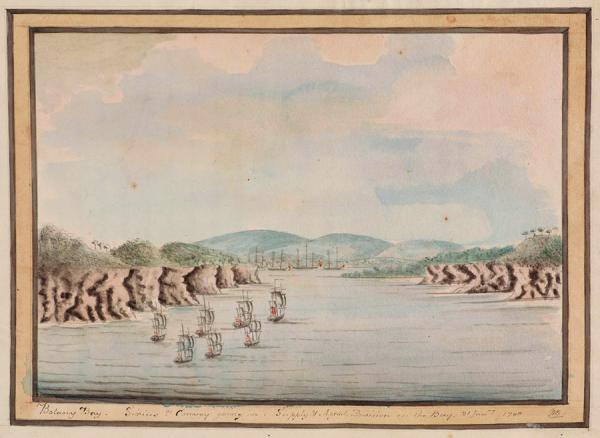
1977
The Transports
This unique project relates the true story of Henry Cabell and Susannah Holmes, convicts transported to Australia on the “First Fleet” in 1787 and the trials and tribulations which culminated in that historic voyage. The tale is presented as a cycle of new compositions in the idiom of traditional English folk song, linked by narrative passages in the style and to the melodies of broadsheet ballads of the time. The orchestral passages and arrangements for the accompanied songs have been conveived in such a way as to underline the overall feeling of “period” and the instruments used are those likely to have been heard in the church bands or “quires” of East Anglian villages in those days. The singers have been chosen from the front rank of the English folk song revival, and the melodies composed to suit their individual style. A detailed account of the historical background... (Continues)
The Transports
This unique project relates the true story of Henry Cabell and Susannah Holmes, convicts transported to Australia on the “First Fleet” in 1787 and the trials and tribulations which culminated in that historic voyage. The tale is presented as a cycle of new compositions in the idiom of traditional English folk song, linked by narrative passages in the style and to the melodies of broadsheet ballads of the time. The orchestral passages and arrangements for the accompanied songs have been conveived in such a way as to underline the overall feeling of “period” and the instruments used are those likely to have been heard in the church bands or “quires” of East Anglian villages in those days. The singers have been chosen from the front rank of the English folk song revival, and the melodies composed to suit their individual style. A detailed account of the historical background... (Continues)
Farewell to our lovers and our kind relations,
(Continues)
(Continues)
Contributed by Dq82 2018/1/4 - 15:16
The Humane Turnkey

1977
The Transports
This unique project relates the true story of Henry Cabell and Susannah Holmes, convicts transported to Australia on the “First Fleet” in 1787 and the trials and tribulations which culminated in that historic voyage. The tale is presented as a cycle of new compositions in the idiom of traditional English folk song, linked by narrative passages in the style and to the melodies of broadsheet ballads of the time. The orchestral passages and arrangements for the accompanied songs have been conveived in such a way as to underline the overall feeling of “period” and the instruments used are those likely to have been heard in the church bands or “quires” of East Anglian villages in those days. The singers have been chosen from the front rank of the English folk song revival, and the melodies composed to suit their individual style. A detailed account of the historical background... (Continues)
The Transports
This unique project relates the true story of Henry Cabell and Susannah Holmes, convicts transported to Australia on the “First Fleet” in 1787 and the trials and tribulations which culminated in that historic voyage. The tale is presented as a cycle of new compositions in the idiom of traditional English folk song, linked by narrative passages in the style and to the melodies of broadsheet ballads of the time. The orchestral passages and arrangements for the accompanied songs have been conveived in such a way as to underline the overall feeling of “period” and the instruments used are those likely to have been heard in the church bands or “quires” of East Anglian villages in those days. The singers have been chosen from the front rank of the English folk song revival, and the melodies composed to suit their individual style. A detailed account of the historical background... (Continues)
Part 1
(Continues)
(Continues)
Contributed by Dq82 2018/1/4 - 15:08
The Ballad of Henry and Susannah

1977
The Transports
This unique project relates the true story of Henry Cabell and Susannah Holmes, convicts transported to Australia on the “First Fleet” in 1787 and the trials and tribulations which culminated in that historic voyage. The tale is presented as a cycle of new compositions in the idiom of traditional English folk song, linked by narrative passages in the style and to the melodies of broadsheet ballads of the time. The orchestral passages and arrangements for the accompanied songs have been conveived in such a way as to underline the overall feeling of “period” and the instruments used are those likely to have been heard in the church bands or “quires” of East Anglian villages in those days. The singers have been chosen from the front rank of the English folk song revival, and the melodies composed to suit their individual style. A detailed account of the historical background... (Continues)
The Transports
This unique project relates the true story of Henry Cabell and Susannah Holmes, convicts transported to Australia on the “First Fleet” in 1787 and the trials and tribulations which culminated in that historic voyage. The tale is presented as a cycle of new compositions in the idiom of traditional English folk song, linked by narrative passages in the style and to the melodies of broadsheet ballads of the time. The orchestral passages and arrangements for the accompanied songs have been conveived in such a way as to underline the overall feeling of “period” and the instruments used are those likely to have been heard in the church bands or “quires” of East Anglian villages in those days. The singers have been chosen from the front rank of the English folk song revival, and the melodies composed to suit their individual style. A detailed account of the historical background... (Continues)
Part 1
(Continues)
(Continues)
Contributed by Dq82 2018/1/4 - 14:46
Song Itineraries:
The War of Labour: Emigration, Immigration, Exploitation, Slavery
Liverpool Lullaby
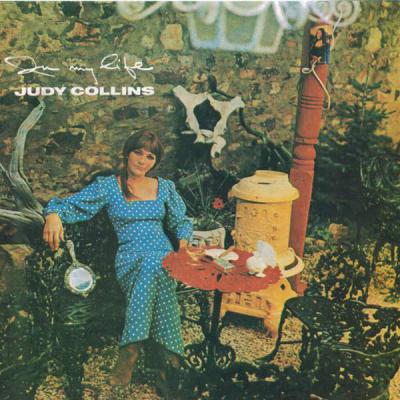
[1960]
Parole di Stan Kelly, nome d’arte di Stanley Bootle (1929-2014), songwriter di Liverpool, nonché importante scienziato informatico
Sulla melodia di "Dollia”, canzone tradizionale del Tyneside, nell’arrangiamento di Stan Kelly
Testo trovato sul sito dell’autore
Ho attribuito questa “industrial-strength lullaby” a Judy Collins perché la sua versione del 1966, nell’album “In My Life”, è forse la più famosa. Va detto però che fu incisa prima da Marian McKenzie e dal The Ian Campbell Folk Group. Notevole anche l’interpretazione di Priscilla “Cilla” Black del 1969.
Parole di Stan Kelly, nome d’arte di Stanley Bootle (1929-2014), songwriter di Liverpool, nonché importante scienziato informatico
Sulla melodia di "Dollia”, canzone tradizionale del Tyneside, nell’arrangiamento di Stan Kelly
Testo trovato sul sito dell’autore
Ho attribuito questa “industrial-strength lullaby” a Judy Collins perché la sua versione del 1966, nell’album “In My Life”, è forse la più famosa. Va detto però che fu incisa prima da Marian McKenzie e dal The Ian Campbell Folk Group. Notevole anche l’interpretazione di Priscilla “Cilla” Black del 1969.
Oh you are a mucky kid,
(Continues)
(Continues)
Contributed by Bernart Bartleby 2015/7/17 - 09:20
Song Itineraries:
Child Abuse, Violence on Women: just like and worse than war
Oh Dear Me (The Jute Mill Song)
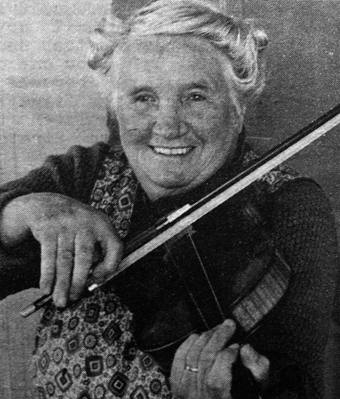
[1920s]
Canzone scritta da Mary Brooksbank (1897-1978), operaia tessile, sindacalista e militante socialista originaria di Aberdeen, Scozia. Membro del partito comunista inglese, negli anni 20 e 30 passò diverso tempo nelle regie galere per via della sua militanza politica. Nel 36 o 37 fu espulsa dal partito per aver detto pubblicamente che Stalin era un brutale fascista e un assassino di massa.
Il testo – ripreso da Mudcat Café – si trova nella raccolta poetica intitolata “Sidlaw Breezes”, pubblicata nel 1966.
Interpretata da moltissimi artisti, a cominciare dal Ian Campbell Folk Group (“This Is The Ian Campbell Folk Group!”, 1963)
“I have never had any personal ambitions. I have but one: to make my contribution to destroy the capitalist system.” Mary Brooksbank.
“The life of the women workers of Dundee right up to the thirties was ... a living hell of hard work and poverty. It was... (Continues)
Canzone scritta da Mary Brooksbank (1897-1978), operaia tessile, sindacalista e militante socialista originaria di Aberdeen, Scozia. Membro del partito comunista inglese, negli anni 20 e 30 passò diverso tempo nelle regie galere per via della sua militanza politica. Nel 36 o 37 fu espulsa dal partito per aver detto pubblicamente che Stalin era un brutale fascista e un assassino di massa.
Il testo – ripreso da Mudcat Café – si trova nella raccolta poetica intitolata “Sidlaw Breezes”, pubblicata nel 1966.
Interpretata da moltissimi artisti, a cominciare dal Ian Campbell Folk Group (“This Is The Ian Campbell Folk Group!”, 1963)
“I have never had any personal ambitions. I have but one: to make my contribution to destroy the capitalist system.” Mary Brooksbank.
“The life of the women workers of Dundee right up to the thirties was ... a living hell of hard work and poverty. It was... (Continues)
Oh, dear me, the mill's gaen fest,
(Continues)
(Continues)
Contributed by Bernart Bartleby 2014/11/3 - 10:13
Song Itineraries:
The War of Labour: Emigration, Immigration, Exploitation, Slavery
The Time Is Near
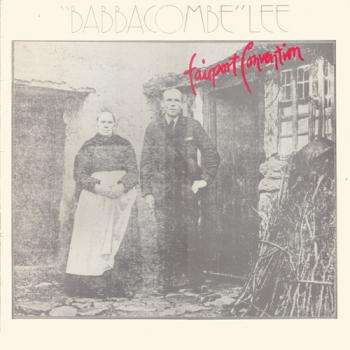
[1971]
Scritta da Dave Pegg (1947-), multistrumentista che ha fatto parte dei F. C., del Ian Campbell Group e dei Jethro Tull.
Nell’edizione in CD dell’album “‘Babbacombe’ Lee” pubblicata nel 2004.
Nell’edizione originale del 1971 i brani non erano distinti ma accorpati in cinque lunghe suite.
Questo era contenuto nella quarta intitolata “John Was Hardly More Than A Bewildered Observer At His Own Trial, Not Being Allowed To Say More Than A Few Words. The Tides Of Fate Wash Him To The Condemned Cell Where He Waits Three Sad Weeks For His Last Night On Earth.”
Un concept album dedicato a John Henry George Lee (1864-1945), meglio conosciuto come John "Babbacombe" Lee o, ancora meglio, come "The Man They Couldn't Hang", un uomo originario del Devon inglese che nel 1884 fu accusato dell’omicidio di una donna. Lui si professò sempre innocente ma venne condannato a morte a... (Continues)
Scritta da Dave Pegg (1947-), multistrumentista che ha fatto parte dei F. C., del Ian Campbell Group e dei Jethro Tull.
Nell’edizione in CD dell’album “‘Babbacombe’ Lee” pubblicata nel 2004.
Nell’edizione originale del 1971 i brani non erano distinti ma accorpati in cinque lunghe suite.
Questo era contenuto nella quarta intitolata “John Was Hardly More Than A Bewildered Observer At His Own Trial, Not Being Allowed To Say More Than A Few Words. The Tides Of Fate Wash Him To The Condemned Cell Where He Waits Three Sad Weeks For His Last Night On Earth.”
Un concept album dedicato a John Henry George Lee (1864-1945), meglio conosciuto come John "Babbacombe" Lee o, ancora meglio, come "The Man They Couldn't Hang", un uomo originario del Devon inglese che nel 1884 fu accusato dell’omicidio di una donna. Lui si professò sempre innocente ma venne condannato a morte a... (Continues)
The time is near for things to pass,
(Continues)
(Continues)
Contributed by Bernart 2013/7/31 - 15:06
Madam Medusa
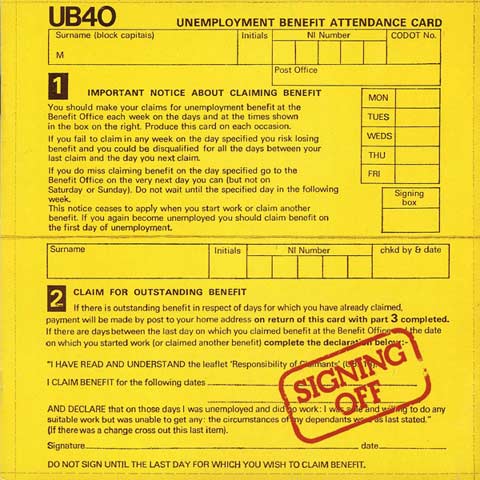
[1980]
Nell’album “Signing Off”, quello che ha in copertina il fac-simile dell’Unemployment Benefit Attendance Card, lo storico modulo giallo siglato UB40 per la richiesta del sussidio di disoccupazione.
Poi anche nel film musicale “Urgh! A Music War” diretto da Derek Burbidge, con una colonna sonora piena zeppa di artisti inglesi della scena punk-rock, new-wave e post-punk.
Ma chi sarà mai questa “Madam Medusa with marble smile and bloody footsteps”? Beh, non può esserci alcun dubbio…
“Run for your life before she eat you alive!”
Scopro che la canzone fu scritta dagli UB40 insieme al folksinger scozzese Ian Campbell...
(Bartleby)
Nell’album “Signing Off”, quello che ha in copertina il fac-simile dell’Unemployment Benefit Attendance Card, lo storico modulo giallo siglato UB40 per la richiesta del sussidio di disoccupazione.
Poi anche nel film musicale “Urgh! A Music War” diretto da Derek Burbidge, con una colonna sonora piena zeppa di artisti inglesi della scena punk-rock, new-wave e post-punk.
Ma chi sarà mai questa “Madam Medusa with marble smile and bloody footsteps”? Beh, non può esserci alcun dubbio…
“Run for your life before she eat you alive!”
Scopro che la canzone fu scritta dagli UB40 insieme al folksinger scozzese Ian Campbell...
(Bartleby)
From the land of shadows
(Continues)
(Continues)
Contributed by Bartleby 2012/3/1 - 08:00
Blackleg Miner
Anonymous
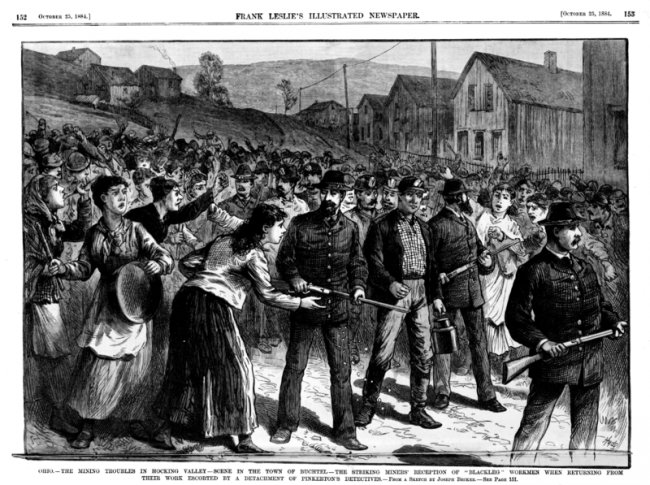
[fine 800/inizio 900]
Trovata su English Folk Music
Testo pubblicato nel 1952 nel volume “Come All Ye Bold Miners - Ballads & Songs of the Coalfields” così come raccolto da A.L. Lloyd, in quegli anni protagonista insieme ad Ewan MacColl del revival della musica folk, dalla voce di un minatore del Durham.
Nel 1962 Louis Killen incise il brano nell’EP “The Colliers' Rant Mining Songs of the Northumberland-Durham Coalfield”
Seguirono le versioni di Ian Campbell Folk Group (1965, nell’album “Coal Dust Ballads”) e degli Steeleye Span (1970, nell’album “Hark! The Village Wait”).
L'ha interpretata anche Richard Thompson in 1000 Years of Popular Music
La canzone è un'invettiva piuttosto violenta nei confronti dei crumiri, durante gli scioperi dei minatori. Un brano molto, molto cantato anche nel corso del famoso “UK miners' strike” del 1984–1985.
Blackleg, scab, strikebreaker = crumiro.
Questo... (Continues)
Trovata su English Folk Music
Testo pubblicato nel 1952 nel volume “Come All Ye Bold Miners - Ballads & Songs of the Coalfields” così come raccolto da A.L. Lloyd, in quegli anni protagonista insieme ad Ewan MacColl del revival della musica folk, dalla voce di un minatore del Durham.
Nel 1962 Louis Killen incise il brano nell’EP “The Colliers' Rant Mining Songs of the Northumberland-Durham Coalfield”
Seguirono le versioni di Ian Campbell Folk Group (1965, nell’album “Coal Dust Ballads”) e degli Steeleye Span (1970, nell’album “Hark! The Village Wait”).
L'ha interpretata anche Richard Thompson in 1000 Years of Popular Music
La canzone è un'invettiva piuttosto violenta nei confronti dei crumiri, durante gli scioperi dei minatori. Un brano molto, molto cantato anche nel corso del famoso “UK miners' strike” del 1984–1985.
Blackleg, scab, strikebreaker = crumiro.
Questo... (Continues)
It's in the evening after dark,
(Continues)
(Continues)
Contributed by Bartleby 2011/5/13 - 11:45
Song Itineraries:
The War of Labour: Emigration, Immigration, Exploitation, Slavery
Across the Hills
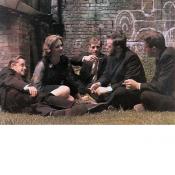
[1964]
Lyrics by Leon Rosselson (published in the songbook "Look Here: Songs by Leon Rosselson", 1968)
Tune derived from the traditional theme "The Gardener"
Recordings:
- Ian Campbell Folk Group, album "Across the Hills" (1964);
- Three City Four (Marion MacKenzie, Ralph Trainer, Leon Rosselson and Martin Carthy), album "The Three City Four" (1965)
- Leon Rosselson with Roy Bailey, album "If I Knew Who the Enemy Was..." (1977)
Canzone nota anche con il titolo "Shadow You Have Seen"
Lyrics by Leon Rosselson (published in the songbook "Look Here: Songs by Leon Rosselson", 1968)
Tune derived from the traditional theme "The Gardener"
Recordings:
- Ian Campbell Folk Group, album "Across the Hills" (1964);
- Three City Four (Marion MacKenzie, Ralph Trainer, Leon Rosselson and Martin Carthy), album "The Three City Four" (1965)
- Leon Rosselson with Roy Bailey, album "If I Knew Who the Enemy Was..." (1977)
Canzone nota anche con il titolo "Shadow You Have Seen"
Across the hills black clouds are sweeping
(Continues)
(Continues)
Contributed by Alessandro 2009/10/3 - 09:57
Death come easy
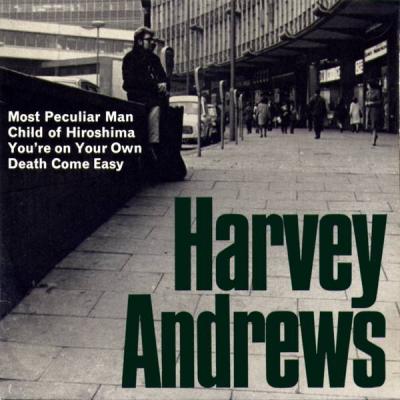
[1966]
Parole e musica di Harvey Andrews
Nel suo EP semplicemente intitolato "Harvey Andrews"
Interpretato anche daThe Ian Campbell Group
Nello stesso disco si trova anche un brano intitolato "Children of Hiroshima" che mi pare ancora manchi sulle CCG/AWS... Ora mi lancio alla ricerca.
(B.B.)
Parole e musica di Harvey Andrews
Nel suo EP semplicemente intitolato "Harvey Andrews"
Interpretato anche daThe Ian Campbell Group
Nello stesso disco si trova anche un brano intitolato "Children of Hiroshima" che mi pare ancora manchi sulle CCG/AWS... Ora mi lancio alla ricerca.
(B.B.)
Death come easy, if you come before your time
(Continues)
(Continues)
Contributed by Alessandro 2008/11/4 - 23:09
×
![]()

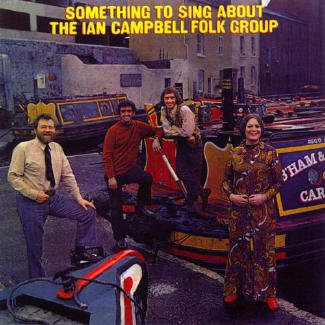
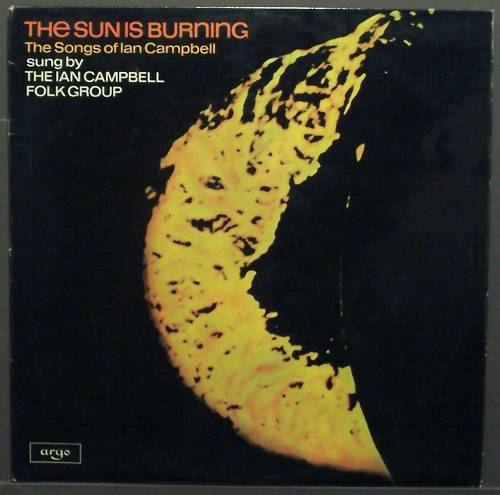
Album "The Sun is Burning" realizzato dal "Ian Campbell Folk Group"
La musica del brano è quella del motivo tradizionale scozzese "A Pair o' Nicky Tams" ("Nicky Tams" erano le stringhe con cui i contadini allacciavano i pantaloni al ginocchio per non infangarli)
La canzone fu scritta sopo una serata passata ad ascoltare i ricordi di un vecchio di Birmingham